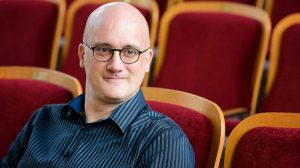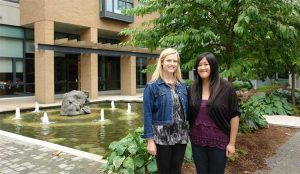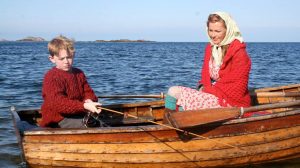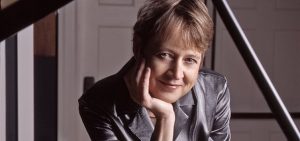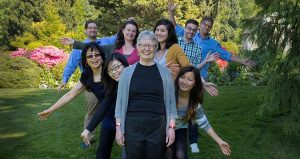Meet Professor C.W. Marshall: Directing The Misanthrope
By Loren Plottel UBC CNRS Prof C.W. Marshall directed the world premiere of The Misanthrope, playing at the Jericho Arts Centre June 4-27, 2010. The play was written by Tony Harrison, an award-winning English poet and playwright, who was a Green College Visiting Scholar in 2009. Best known for his controversial works like the poem ‘V’ […]
Meet Karrmen Crey and Amy Perreault: Creating change through storytelling
As a directed studies project in the First Nations Studies Program, Karrmen Crey and Amy Perreault recently completed What I Learned in Class Today, a film documenting the responses of nine students to intentional and unintentional occurrences of racism.
Karrmen Crey and Amy Perreault say their video project began as a vent session in a course they were taking with First Nations Studies Professor Linc Kesler.
“We would start the class by telling stories about classes we were in,” relates Crey, a recent graduate of the program.
The stories, she adds, were a way of dealing with some of the offensive and ignorant statements they had heard about Aboriginal people — not on the street, but right in their classes at UBC.
“They were kind of funny, they were, of course, kind of absurd,” Crey says of the remarks of some UBC students and professors.
The statements were profoundly hurtful, often for no other reason than the fact that non-Aboriginal students sometimes forget that in talking about the historic challenges faced by Canada’s First Nations, they are talking about issues that Aboriginal students among them have experienced themselves.
Noting a pattern, Kesler observed that it would be a good idea to gather the stories of Aboriginal and non-Aboriginal students alike.
That suggestion lit a fire under Crey and Perreault — both senior undergraduate students at the time. They were highly interested in developing a resource that would help fellow students and faculty discuss sensitive inter-cultural issues without hurting, or alienating people.
As a directed studies project in the First Nations Studies Program, Crey and Perreault recently completed What I Learned in Class Today.
Video, they discovered, was a perfect medium, especially for getting uncomfortable first-person experiences out in the open.
They’ve screened a preliminary version of the video at several forums, including UBC’s Realities of Race conference in March 2007. In each case, audience members have been struck by the honesty of the students, who express their stories in their own words.
“You read a report, you can look at statistics, but actually being faced with students at UBC right now who are experiencing these things is pretty powerful.”
Dara Kelly is one Aboriginal student interviewed in the film. A member of the Fraser Valley Le’qa:mel First Nation, Kelly was in an English class with a focus on Aboriginal authors last year when one student prefaced a group discussion by asking why Aboriginal people were so “screwed up.”
For Kelly, that comment felt like a slap in the face, and in the film she candidly discusses why she finds the remark totally unacceptable.
“At the same time, when that kind of incident happens, it’s almost so shocking, or unbelievable, or hurtful that nobody says anything, and nobody knows what to do,” she says.
That’s one of the reasons Crey and Perreault created the video in the first place — the aim is to talk about these discussions, and to acknowledge that these aren’t just difficult for Aboriginal students.
People may recognize that something is racist, or insensitive, but not know what to do, or say, underscore Crey and Perreault.
Crey and Perreault say they intend to widen the scope of the project and add more interviews, as well as related classroom material, to accompany the film.
With the broad goal of removing an institutional barrier to Aboriginal post-secondary education, they plan on crafting their project to make it a resource for teachers at UBC and other institutions, something relevant to larger, multi-ethnic audiences.
“This video is here and it’s available,” Perreault says, “so let’s start talking about it instead of not talking about it, or talking about it in the hallway after class.”
———
By Bryan Zandberg (BA, 2006, in French and Spanish). Bryan is a former editor with The Ubyssey.
Meet BA ’06 Alexandra Chu: The possibilities of Arts Co-op
The artist’s nickname is “Crabby Tanabe,” and despite his daunting reputation, Alexandra Chu wanted to interview him.
When Takao Tanabe finally called, the 80-year-old Governor General award-winning landscape artist wanted to know exactly what the UBC student knew about visual arts to write an article about it.
Chu, who graduated in May 2006 with a BA in English literature and minor in history, admits she didn’t know much, but she loved the artist’s work and, more importantly, she could write.
Chu considered her profile on Tanabe, which appeared in Ricepaper, the Vancouver-based magazine focusing on Asian Canadian arts and culture, as one of her favourites.
Other profiles she has written include Whistler’s own National Alpine ski racer and Olympic hopeful, Britt Janyk, and illustrator Marcos Chin, the artist behind the “look” of online dating giant, Lavalife.
“Anyone who does reporting, you feel so proud when you have your name out there,” Chu says. “You can google yourself and things come up.”
You could say Chu is building her future one word at time. Literally.
Chu was the recipient of the first-ever UBC Arts Co-op Student of the Year Award, a recognition she received after spending a term writing for FrontCounter BC, a one-stop shop for natural resource businesses wishing to obtain required paperwork.
From the pilot office in Kamloops, BC, Chu assisted in setting up nine other locations throughout the province. She developed content and layout for the agency’s website, created marketing brochures, and produced an online newsletter that caught the eye of an assistant Deputy Minister.
Impressed by the quality and language of Chu’s work, the agency continued publishing the newsletter past its scheduled end date of December 2006.
“She’s a good example of a student who really understood that career development is not something that happens overnight,” says Julie Walchli, founding director of the UBC Arts Co-op Education Program.
“So step-by-step, co-op term by co-op term, and freelance writing assignment by freelance writing assignment, she built a very impressive portfolio and is now graduating with a lot of experience under her belt and a lot of contacts.”
Chu got her big break at the Whistler Museum and Archives, her first co-op work term in 2004. Asked to do an independent research project to contribute to the museum’s records, Chu profiled the movers and shakers of the famed mountain resort community.
“I’d never interviewed, I didn’t know how it would go. I didn’t know if I’d follow the questions I’d set out, or if I’d talk freely,” Chu recalls.
“A few months later, the curator sent me an e-mail and she wanted to use parts of my project for a feature article that was on the cover of the news magazine The Pique for women’s history month.”
When the article appeared, the curator had written an introduction and a conclusion, but the rest was all Chu’s work. “And so that was my start,” she says.
From her first publication at Whistler to writing articles for the Faculty of Arts’ newsletter and website, to being the visual arts editor at Ricepaper, to helping launch FrontCounter BC, the judging committee was impressed, says Walchli.
“A lot of students in Arts want to be journalists, or professional writers in some way, and often it’s hard for them to know how to get started in that career,” Walchli says. “And Alexandra knew that each of her co-op terms and the things she did outside of co-op were building blocks to that ultimate goal.”
Chu’s spot on the Dean’s List during every term at UBC and her onerous role as the editor of the UBC Arts Co-op student newsletter were a some of the many reasons that set her apart from other award candidates, adds Walchli.
From having career goals of wanting to write for a living to interviewing prominent people, Chu has built a hefty portfolio.
“It’s been really exciting because [Ricepaper] is nationally published, and it’s nice to know that someone in Toronto might be reading your work,” says Chu of her feature articles.
Chu acknowledges she was intimidated by the prospect of interviewing Tanabe, but she was in for a surprise after his unexpected call, which produced a personal invitation to his retrospective exhibition.
“He was just so nice. He was the kindest person,” she recalls. “He talked — he was really candid. I love meeting people like that. And some articles, they just come. You just write them, they’re there.”
Today, Chu is the assistant director of marketing and client services at Canadian Education Centre Network, a non-profit company aiming to promote Canada as a study destination for international students. She is one of roughly 2,000 students graduating with an Arts degree this year.
Not bad for a girl who didn’t know what she wanted to do with her English degree. But after four co-op terms at UBC, Chu thinks of her degree as a valuable learning opportunity, helping her to develop her career.
“It’s been about finding what I could do with my English major,” she says.
“At first, with English literature, it seemed like there was not a lot to do,” recalls Chu. “But I think of my writing skills and my research skills as traits. And a lot of people don’t think of it that way, but I think of them as traits that I’ve developed because people commission me to write articles and pay me.”
Chu considers the network of contacts she has built to be invaluable.
“The people you meet are just as important as the jobs you do because you’ll meet people who will be really supportive, who will be references for you to get a career when you graduate, who will help you find other things you’re interested in,” Chu says.
“Like in Whistler, I was really interested in writing. They let me go with it. They helped me to make it something more than just a book in the museum that people may or may not look at.”
Chu, who spent the other co-op terms writing and researching for the Dean of Arts office, the Richmond Museum, and the Whistler Museum and Archives, credits her UBC degree for providing her with transferable skills.
“One of the things in Arts is thinking outside the box. You may not graduate with something like an accountant where you have a specific job, but you have these skills to do anything,” she adds.
“I have a wealth of experience working with children, working as a writer and reporter, working on websites, working with customers in museums, communicating through all sorts of avenues.”
By Bryan Zandberg (BA, 2006, in French and Spanish). Bryan is a former editor with The Ubyssey.
Meet Erin York: Student education through the Arts
Hailing from Seattle, Washington, Erin is a film studies graduate with a drama minor and one of the 20 international students formally enrolled in the UBC Arts Co-op Program. While many students going into the program are still unsure about their career goals, Erin knew from the start what her ultimate dream job would be and how the co-op program would help get her there.
Meet Alumni Mark McGuckin and Calum MacLeod: Creators of the television show, Road Hockey Rumble
How did two UBC film grads get their own television series after graduation? By doing what they love most: filming and playing road hockey. Mark McGuckin (BA ’04 Film Production) and Calum MacLeod (BA ’03 Film and TV Studies) — co-hosts, writers, and creative producers of “Road Hockey Rumble” — take their love of the game across Canada.
Three UBC Arts alumni collaborate on film – A Shine of Rainbows
It’s a small world after all: Editor Alison Grace (BA ’71 Film) ,Screenwriter Dennis Foon (MFA ’75 Creative Writing), and Associate Producer John Bolton (BA ’99 Hon. English) collaborated on the recently released and award winning film A Shine of Rainbows. A UBC Arts degree can connect you with talented peers for years after you graduate and take you around the world; in this case, a film set in Ireland.
Meet Professor Emerita Jane Coop: Playing the piano
One of Canada’s most celebrated pianists, Coop is head of the keyboard division at the School of Music, where her work earned her the laurels of Distinguished University Scholar in 2003 and, more recently, the 2007 Killam Teaching Prize, which recognizes UBC’s best teachers.
Meet Dr. Margery Fee: Fostering student engagement
Professor Margery Fee completed her PhD on Canadian literary history at a time when the topic was not as popular as it is today. “People just laughed and said, ‘You want to do a thesis on Canadian literature? Is there any?” Fee says of her years as a graduate student. Since then, Canadian literature has become a legitimate area of study, and Fee has remained committed to giving students “subject matter that they are interested in.”
Meet Professor Jerry Wasserman: Living a ‘parallel career’
It’s not every day you get home from a long day at school, flop on the couch, flip on the TV, and see your prof.
But that happens all the time for Theatre and English Professor Jerry Wasserman’s students. They’re just as likely to catch him in an episode of The X-Files, or Battlestar Galactica — or on the silver screen — as they are to see him in class.
Ever since he moved to Vancouver from his hometown New York City in 1972, Wasserman has been living out what he calls his “parallel career.”
By day, he’s a prize-winning professor and a respected academic. The rest of the time, he’s hard at play in “Hollywood North,” Vancouver’s booming film industry, where he’s got more than 200 acting credits to his name. “It’s been great having this dual life,” Wasserman says, beaming his megawatt smile. “I’m the luckiest person I know.”
Sure, his work as an actor has seen him consort with celebrities like Will Smith and Ethan Hawke, but he’s adamant that teaching is no bit part in his career.“I love teaching,” he says. “At best, it’s this kind of ridiculously ideal job where you get to talk about interesting things to interested and interesting people. And someone pays you for it? I mean, what could be better than that?”
The classroom, to his mind, is a kind of stage in its own right — especially when it comes to Monday morning survey courses, where students fight to keep their eyelids open. “I figure it’s my job that a) the students stay awake, and b) they stay engaged,” Wasserman says. “And that’s an actor’s skill.”
Acting skills he has in spades, but he says the class-as-theatre analogy has its limits. “There’s a fine line between upstaging your material and utilizing those skills to maximize students’ engagement with the subject at hand.”
It seems to be working — UBC honoured Wasserman with a Killam Teaching Prize in 1998 and the Dorothy Somerset Award in Performance and Development in Visual and Performing Arts in 2005.
Trained as a 20th Century English and dramatic literature specialist at Cornell University, Wasserman became deeply involved in that university’s theatre scene. When he came to Vancouver to teach canonical British writers like Beckett, Woolf, and Conrad in the Department of English, he soon started acting and lecturing on Canadian theatre. “The field of Canadian drama studies was wide open, it was literally brand-new,” says Wasserman, who recalls that at the time he was literally able to read every play ever published in Canada. “I came in right on the ground-floor of a new discipline.”
He became a leading expert in the field, publishing among other things the book Modern Canadian Plays (Talonbooks: 1985), an anthology that has since become the major textbook in the field.
Extremely thankful to work at a university that has supported his double life, Wasserman equally credits lady luck for allowing him to be in the right place at the right time.
“I wake up in the morning sometimes and I have to pinch myself, you know, because I’m living the dream.”
Alumni Stan Persky wins Lieutenant Governor’s Award for Literary Excellence
Born in Chicago, Persky immigrated to Vancouver in the 1966. UBC BA’69 (Anthropology) MA ’79 (Sociology), Persky has been a media commentator for CBC and literary columnist for the Vancouver Sun, the Globe and Mail, This Magazine, Saturday Night and The Tyee. Persky also regularly contributes articles and reviews to Dooneys Cafe and his personal website, splitting his time between Vancouver and Berlin.
Persky is a Philosophy instructor at Capilano University and author of 20 books, including Fantasy Government: Bill Vander Zalm and the Future of Social Credit, The Short Version, At The Lenin Shipyard: Poland and the Rise of the Solidarity Trade Union and Buddy’s: Meditations on Desire. He co-founded the Georgia Straight Writing Supplements which led to the establishment of the Vancouver publishing house New Star Books.
“We have chosen Stan Persky as the recipient of the 2010 Lieutenant Governor’s Award for Literary Excellence because of the intellectual and moral integrity he brings to his work as a writer who engages with some of the most difficult questions facing society, and because of the great contributions he has made to the literary canon of Canada and British Columbia.
His numerous books and his trail-blazing efforts in creating literary journals and a forum for public engagement – not least New Star Books and the Georgia Straight – have helped develop British Columbia’s literary community into what it is today. His grace as an essayist, his curiosity and independence of thought as a critic and newspaper columnist, and his exuberance as a civil rights activist and a leading voice of the gay community have enriched us all.
Stan Persky is our Socrates. British Columbians can rightly boast that he is truly one of ours. ”
-Terry Glavin, 2009 recipient of the Lieutenant Governor’s Award for Literary Excellence.
The $5,000 award is given annually to a B.C. writer who has contributed to the growth of literary excellence in the province. Persky was presented with the award by the Honourable Steven Point on April 24th. He commented in an email to Capilano University Newsroom that “I received the lieutenant-governor’s letter informing me of the reward April 1, so I immediately assumed it was an April Fool’s joke. Once I persuaded myself that it wasn’t a seasonal hoax or a quirky display of the L-G’s sense of humour, I immediately thought of the names of about 20 other writers in B.C. who are probably more deserving of receiving this honour than I am.”
Other UBC finalists for the BC Book Prizes include alumna (Sociology) and Assistant Professor Larissa Lai, whose book of poetry Automaton Biographies was short listed for the Dorothy Livesay award and alumna (Creative Writing) and Adjunct Instructor Annabel Lyon whose novel The Golden Mean was shortlisted for the Ethel Wilson Fiction Prize.
[Photo courtesy BC Book Prizes]
